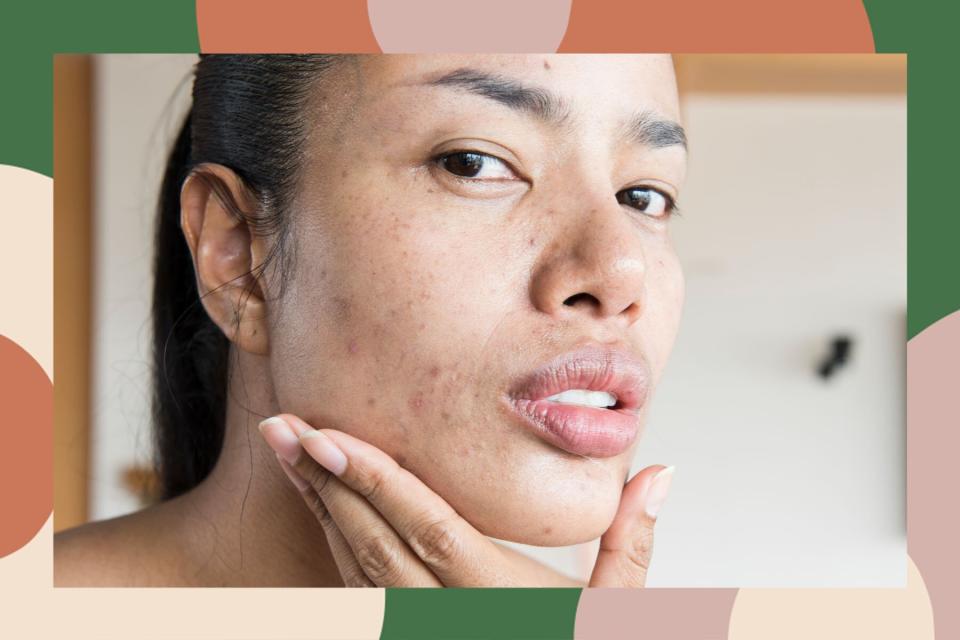Flat Acne is Trending on Skincare Reddit—But How Do You Treat it?

Getty Images
Welcome to The Spot, a monthly column tackling acne and our relationships to it. Here, we ask women how they deal with blemishes at home—and consult with skin care experts to find out what really works.
Fact: Aside from arming us with some amazing product dupes, the r/SkincareAddiction subreddit always brings some jaw-dropping acne content to the table, as we are always a sucker for those mind-blowing transformation photos. However, we'd be lying if we didn't say r/SkincareAddiction also brings about some interesting acne topics and questions. After all, a recent March 2021 thread recently asked the question what is "flat acne" (WTF!!!) and how do you even treat it? To address this pressing acne question, we tapped five dermatologists to dish on all things flat acne, including its causes, and when it may be an indicator of a more serious problem.
What is flat acne?
As scary as they look, flat acne isn't anything to panic over. Board-certified dermatologist Horam Yarth, M.D., explains to HelloGiggles that flat acne is just another name for non-inflamed acne lesions such as whiteheads and blackheads.
However, there are instances when flat acne can also be scarring in disguise, as board-certified dermatologist, Amanda Doyle, M.D., FAAD, says the Reddit photo in question appears to be post-inflammatory hyperpigmentation (and scarring) from an older, fading acne lesion.
"This type of spot could be a type of scarring, and it does show some surface change consistent with a scarring component," Dr. Doyle tells HelloGiggles. "When there is inflammation in the area from a pimple, it can leave a dark pink or brown discoloration on the skin at the site of a recent pimple."
What causes flat acne?
"These flat acne lesions are clogged pores—also called closed comedones. They form when dead skin cells fill the skin's oil glands' opening and block the flow of the sebum," explains Dr. Yarth. "This mix of dead skin cells and dried sebum accumulate in the upper part of the skin glands and form whiteheads. When the sebum is incorrect with the air, it oxidizes and changes its colors to black blackheads."
How do you treat flat acne?
Thankfully, some cases of flat acne can be treated with over-the-counter products. These include the use of sunscreen (SPF 30 and higher), retinol, and moisturizer products, according to board-certified dermatologist Malini Fowler, M.D. "If you notice these flat pimples, you should use a retinol and sunscreen to prevent scarring," Dr. Fowler advises. "Lesions should lighten and clear within a few weeks to months."
hellogiggles Available at Amazon
Skincare products containing AHAs and BHAs can also be helpful, as they can tame down inflammation, and promote exfoliation, says Dr. Yarth. Though, as a rule of thumb, you'll want to make sure the products you are using have the right combination to ensure it's helping your skin rather than irritating it. "The best products to reduce non-inflamed skin-colored bumps will be a combination of medicated cleanser, and night treatment containing salicylic acid (BHA) or glycolic acid (AHA)," he tells HelloGiggles.
hellogiggles - $7.20 Available at Sephora
Similarly, clay masks can also be used to prevent future breakouts from coming to the fold, as they detoxify the skin from impurities stuck in the pores, Dr. Yarth adds. "These clay masks absorb sebum from enlarged skin oil glands, thereby reducing the size of pores and the number of blackheads and whiteheads," he says.
hellogiggles - $54 Available at The Detox Market
But while some topical products can address issues of hyperpigmentation and redness over time, there are other cosmetic ingredients you should avoid, according to Dr. Harth. For starters, he advises steering clear of using essential oils to treat your breakouts, as they can be irritating and comedogenic (meaning they clog pores). Similarly, oil-based ingredients (Shea butter, coconut and almond oil, etc.) should also be avoided as they can lead to breakouts. Bleaching creams (and other irritating products) are also on the do not use list, as Dr. Emmanuel Loucas, director of Lucas Dermatology & Laser Center, says these products often make the skin red, rather than fade dark spots.
What to do if your flat acne doesn't go away:
Since no two cases of acne are alike, Dr. Fowler suggests scheduling an appointment with a dermatologist to get to the root of your skin woes. "If you have flat acne, then you likely have active acne," she says. Additionally, she says that dermatologists can provide in-office treatments such as lasers, chemical peels, and microneedling, all of which can reduce scarring and hyperpigmentation. If getting an in-office treatment doesn't sound appealing to you, prescription-strength retinoids and oral medications can be other forms of treatment, says board-certified dermatologist Suzanne Friedler, M.D. However, if your flat acne is a cyst, Dr. Loucas suggests talking to your dermatologist about cortisone injections and birth control as they can decrease pimple size and keep future breakouts at bay.

 Yahoo Sport
Yahoo Sport 





































